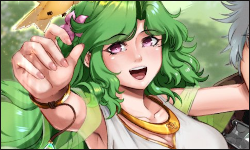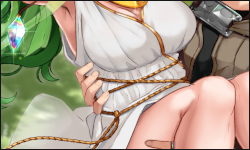This post requires a background. I watched White Album 1 soon after I started to watch anime shows. I was very conscious of reviews at the time, and most of what I watched was based on suggestions. Around the time, I also watched White Album 2, Golden Time, Sakurasou, Clannad, Toradora, and more well-regarded romance anime shows. I also forayed into some that weren't as greatly liked, and they mostly fit their reputations. It has been around six months since then, and I have continued to watch from the genre, but also expanded into many others. The only show to deviate largely from what others have said has been WA1.
When I finished WA1, I could tell something wasn't right. I felt like I had missed something. Too much didn't add up, yet it didn't feel like a failure in production. I ended up re-watching it once alone, and then another two times with friends. I discovered more each time. I could not have written this without substantial spoilers, although I imagine for those I am targeting it should not be a problem.
This show is less about Touma than people think – he is merely reactionary to everything going on around him. Those aspects are what captivated me. This show is filled with very complex character relationships and deep character personalities that are active throughout the show, but only reveal themselves around the ending. Most of the main characters do not fall in love with Touma. I repeat, they do not fall in love with Touma. Accept that idea. Instead, they use Touma to compensate for something lacking in their own lives. I will go through the list of girls, from the least interesting to the most.
The least interesting girl is Yuki. She is actually in love with Touma, and pretty much can be taken for face value in the show. I think she is meant as a foil for the other characters; she is there to encourage the viewer to consider the other characters differently. Unfortunately, this tactic is either ineffective or has the opposite effect.
The next character to consider is Misaki, the theater girl. She is also not very interesting. She wants to get closure with Touma on their relationship over the past several years. Misaki was just too attached to Touma and he could not reciprocate those feelings until temptation became too much in the situation. She got what she wanted, and thought that one time would resolve her feelings – despite that, she would not achieve the feeling's end that she wanted, and it would continue to plague her.
Haruka is a mixed bag. She was very difficult. When her brother died, she could not cope with the shock, and became stuck psychologically to before then. She becomes very attached to anything from before the event, which is why she became obsessed with Touma. She didn't want him to move on and leave her behind. She is willing to do anything to prevent that. Haruki gets attached to Mana, the tutored girl, because it feels like she has a younger sibling again. That's why she takes up her old hobbies with Mana, even if she cannot keep up. Mana satisfies the hole Haruki's life that her brother left, and helps to maintain the projection of her past onto her present. She is one of the few characters I really, truly hated, and is absolutely brilliant.
Mana lacks a true family. She subconsciously despises the industry that keeps her mother distant. When Touma talks about his relationships with Rina and Yuki, she refuses to acknowledge it as truth because of this. She wants her life to be far from that society. Eventually, Mana and her mother come to reconcile, and Mana can finally realize Touma's relations with the pop singers in the same hand.
Rina, I have yet to totally figure out. It is still developing. It is related to her relationship with her brother. Yet, she is not keenly aware of the painting-related insanity that he is going through. Rina is very frustrated that her brother is downplaying her growing career in favor of Yuki's. She is frustrated with his distancing from her, and tries to use Touma as a foil. As her brother goes down in flames, she no longer needs Touma like that, and the ending - “thank you, and goodbye” reflects how he has helped her get past this.
The most interesting character is the manager, Yayoi. By far. She is the primary reason I started to delve deeper. It should have been figured out by most people that she was in love with Ei Ogata. Only her and Master [of silence] Nanase know fully about Ei's obsession with the painting. Everything she does is in the effort to keep Ei afloat mentally. A large portion of this is maintaining his absurdly expensive addiction to the paintings. So, when she notices his growing disinterest in Rina, knows that the company needs Yuki to be successful to keep Ei financially stable. Yayoi then works to eliminate anything in the way of Yuki's success. She knows that Yuki emotionally needs Touma, and so Touma's actions could be very consequential. That is why she works to keep Touma satisfied, yet also distant enough from Yuki to keep her from worrying. Remember at the end when Yayoi says to Touma that she “failed”? Yayoi wasn't talking about keeping Touma away from Yuki. Ei had already been arrested and ruined at that point, mentally and financially. Yayoi had failed to keep Ei. Yayoi had been cold and calculating through the series because her entire emotional effort was devoted to Ei. So, at the end, we see her distress and depression in the night scene with Ei's car.
Here is where the fatal flaw of the show is: it assumes that the viewers will not only devote the amount of thought necessary to figure out the relationships, but that the viewers are actually capable of it. I strongly believe that a share of the anime community is not capable of figuring it out. This problem was compounded by the show's unfortunate proximity in genre and release date to School Days – a show that is the actual incarnation of the many problems people project onto White Album. The show was not a failure of development, plot, production, and characterization. The music is beautiful, the art is well-done, it avoids tropes/cliches, and the character relationships are deep and complex. Instead, White Album was a failure in being too deep and complex – a quality that made it fail to communicate to the majority of the audience. So if you want to discover one of the best characterization-based animes, it is White Album. It's just that the complexity and depth require a lot more attention and thought than most people are willing to commit, and it gets a bad reputation because of that. So, to me, this makes it among the most underrated anime. |



